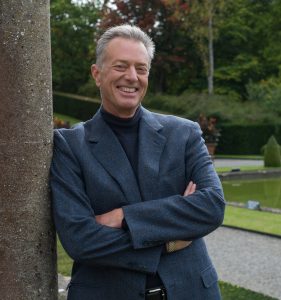“I can be changed by what happens to me. But I refuse to be reduced by it.”
Maya Angelou
The summer after finishing university, I left the United States. My plan was to spend a year in London studying for a masters in economics, then return home to North Carolina. Instead, I moved on to Switzerland, then Africa, then back to Switzerland, Italy, and finally at age twenty-eight I became a consultant in Germany. By that point, I knew I could make a living in business. Even so, I feared it was never going to give me the fulfillment or sense of belonging that I so craved.
Six months later, after a remarkable series of events (another story for another time), I started writing.
I wrote for nine years and completed seven books before my first was published. Pause here for a great deal of heartache, sweat, and struggle. NINE YEARS. SEVEN BOOKS. Working a full-time day job throughout.
Six years into this struggle, I wrote two Swiss friends saying that I was on the verge of giving up. These two guys, who did not know each other, both responded with the same message: I needed to come smell the ice.
I had of course heard the expression before. What they meant was, I should travel back to Switzerland and hike a glacier face. During my five years in Switzerland, I had skied over glaciers any number of times. But this being August, what they meant was something else entirely.
My Swiss friends insisted it was time, as they put it, for me to meet the ice on the ice’s terms. Alone. When the power was total, and the ice was my entire world. The rock and the ice and the power and the solitude.
So for my summer vacation I took the train down, and then another train, and finally arrived in Zermatt, the closest village to the Matterhorn. Early the next morning I took the Gorner Bahn to the top station, and arrived at the trail soon after the sun crested the surrounding peaks. Most glaciers are constantly on the move, which creates deep fissures and highly unstable surface ice. Chasms hidden beneath what appears to be a stable ice-face can be a quarter of a mile deep. But the Monte Rosa walk was unique. Zermatt is home to the only Swiss glacier stable enough that I could cross alone, without being roped up or in the company of a guide.
As I stepped onto the ice, a pair of Swiss army four-tracks slowly made their way along the perimeter trail. They halted where a narrow tongue of earth jutted like a peninsula into the ice. Soon as the engines died, three generations started piling out. Mom, Dad, more kids than I could count, another older couple, and piles and piles of gear. Only this was not mountaineering equipment. Instead, I watched them pull out frosted wine buckets, a case of champagne, picnic hampers, bottles of lemonade for the kids, a basket that wafted the scent of fresh-baked bread, a bag from the Caviar House, a wooden bucket of butter, and an entire wheel of cheese. Then the four adult men took hold of a padded stretcher and slowly, gently, drew out a very old lady.
As the men started across the ice, I saw that one was limping and clearly in pain. So I went over and asked if I could help. They explained that their grandmother was dying with cancer, and her last wish had been to ‘smell the ice’ once last time.
The old lady was there and not there. She smiled whenever someone spoke to her, and had a gentle hand for every child that came within reach. But her attention was really on the ice.
We hiked for about an hour, out to where the entire world was white. I left them when they stopped and began preparing their picnic feast. As I started away, the grandmother waved me over. She asked my name, then said in parting, ‘May you be blessed with a life of second chances.’
I left the family to their happy-sad outing and hiked across the glacier and up to the Monte Rosa hut. There is a healing quality to the ice in summer. The silence is much more intense this time of year. The mountains are very individual. Uncovered from their uniform winter blankets, they reveal very unique characters. The light is as glorious as the quiet.
This hike split me away from the hurried rush of business pressures and modern life. I was gifted a visceral bond to a very different world. Here on the ice, time measures seasons like we do seconds. The ice was here long before we arrived, and will remain long after we are gone. This walk offered me a partial, momentary, imperfect glimpse into what it means to live for eternity. At that crucial juncture in my life, this small fragment was enough.
When I returned at sunset, the family was gone. But the grandmother’s words held me still. As they do now, thirty-five years later.
American psychologist Abraham Maslow defined a ‘peak experience’ as a unique moment when time loosens its hold, the self evaporates, and the individual becomes captivated by a different and ecstatic view of their world.
In the coming posts, my aim is to examine the creative life from two perspectives. One will focus upon the commercial. How can the artist reach the point where they can live from their work. What does this mean in terms of commitment, focus, and aims.
Balanced with this will be my second direction; how to create an environment where such peak experiences are welcome. It is nigh on impossible to generate such moments at will. But they can be encouraged. The creative environment can actually foster their arrival. With time. And discipline.
Let us begin.
DO THIS NOW:
- Close your eyes. Think back to an experience so beautifully intense that ‘time’ and ‘self’ were concepts that simply did not belong.
- While in this moment, tell yourself that you invite such experiences again. You welcome them into your life. You are open to them, in whatever new form they care to take.

Davis Bunn’s novels have sold in excess of eight million copies in twenty-four languages. He has appeared on numerous national bestseller lists, and his titles have been Main or Featured Selections with every major US book club. In 2011 his novel Lion of Babylon was named Best Book of the Year by Library Journal. The sequel, entitled Rare Earth, won Davis his fourth Christy Award for Excellence in Fiction in 2013. In 2014 Davis was granted the Lifetime Achievement award by the Christy board of judges. His recent title Trial Run has been named Best Book of The Year by Suspense Magazine. Lately he has appeared on the cover of Southern Writers Magazine and Publishers Weekly, and in the past three years his titles have earned him Best Book and Top Pick awards from Library Journal, Romantic Times, Publishers Weekly, Booklist, and Kirkus. His most recent series, Miramar Bay, have been acquired for world-wide condensation-books by Readers Digest. Currently Davis serves as Writer-In-Residence at Regent’s Park College, Oxford University. Until Covid struck, he was speaking around the world on aspects of creative writing.





No Comments